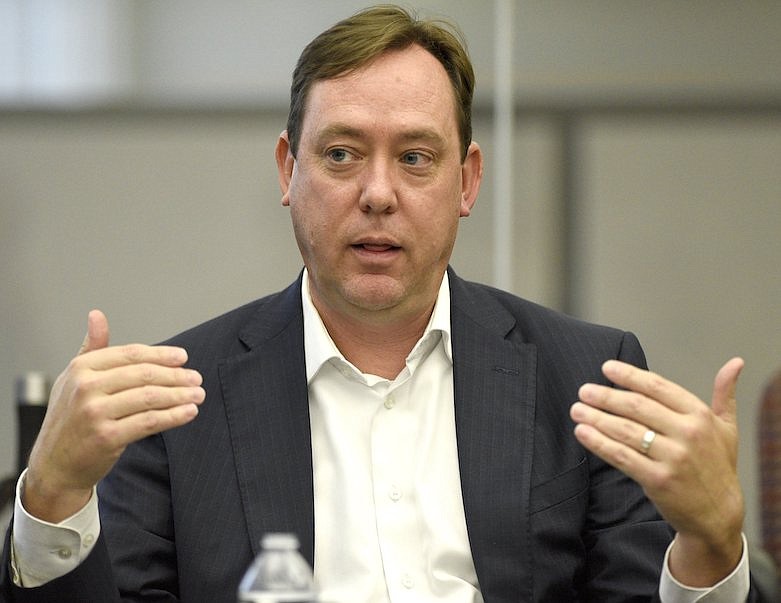Chattanooga's economic development strategy has traditionally focused on helping local businesses grow and recruit new businesses to the region.
Economic recruiters like Charles Wood at the Chattanooga Chamber of Commerce focus on trying to keep existing businesses thriving in Chattanooga and convincing other businesses to relocate or invest in the Scenic city as a way to promote jobs and economic growth. To help staff those new and growing businesses, the Chamber has also sought to recruit talent to town to fill the job needs in expanding industries.
But like just about everything else, the coronavirus is changing the way business gets done and could create a new opportunity for growth in Chattanooga. The trend toward working at home pushed by the stay-at-home orders in response to the COVID-19 pandemic could shift at least part of the economic development strategy toward workers more than just business owners or managers.
"What has happened over the past couple of months has really shed a light on the potential for some new growth approaches," Wood said.
If employees can work from home almost anywhere, many workers will be able to choose where they live and do their jobs. With more remote work options, many workers could migrate from expensive hubs like Silicon Valley, Seattle, Boston and New York to more affordable places like Chattanooga.
Chattanooga, which bills itself as both the Scenic City and Gig City, boasts both a beautiful location and a technology connected city to capitalize on the work-from-home trend.
Chattanooga's relative cost of living also gives it an advantage. According to studies conducted for Bestplaces.net, Chattanooga's overall cost of living averages 16.2% below the U.S. average.
Housing costs provide the biggest advantage with the average home in Chattanooga priced about a third less than the U.S. average, according to the National Association of Realtors. Utilities average 5% less than the country as a whole and transportation averages nearly 19% less than the U.S. median.
With the only citywide 10 gigabyte-per-second internet service offered to every home and business through EPB Fiber Optics, Chattanooga also boasts the fastest community-wide internet links to facilitate remote work. For businesses shipping real-life goods, not just remote technology, Wood said Chattanooga also is well located within a day's drive of nearly half the U.S. population while still boasting remote, outdoor attractions within a half hour's drive of most homes in the area.
Adam Kinsey, president of the Chattanooga Choo Choo, said Chattanooga needs to try to capitalize on the work-from-home trend by recruiting workers to the Scenic City by creating the best lifestyle available.
"If WFH (work from home) becomes a permanent movement how can we, as Chattanooga, recruit these workers from around the country?" Kinsey wrote in a Twitter post. "Highlight cost of living and proximity to Nashville and Atlanta, develop more co-living concepts and focus on urban infill."
Kinsey suggests perhaps Chattanooga can be developed sa "a new rural but modern community."
Preston Holland, a mobility consultant in business development at 101 Mobility in Chattanooga, also thinks Chattanooga should try to capitalize on the at-home work trend.
"This area is asking for it!" he tweeted. "We're a prime candidate.""
Eric Fuller, president of U.S. Xpress Enterprises, said Chattanooga's Gig internet connections allow people to live in Chattanooga and more easily work elsewhere than in many cities. But residents are still eager for quality schools.
"The internet speed helps," Fuller said in a tweet. "But the key is better schools. I envision people living wherever they want and can work for any company in the country. But the number one concern will always be school quality."
Brian Bowden, principal software engineer at getpeakmoney, said the work-from-home trend will allow businesses to tap the best talent from anywhere they choose so individual workers will have to compete with other workers around the globe.
"One of the big advantages of hiring remote workers is that you have access to a national (even global) talent pool," he tweeted. "That said, with our low cost of living, I wouldn't blame people for moving here."
But Chattanooga still doesn't offer some of the appeal of bigger markets.
David Alfonso Castaneda, a New York city native who holds dual-citizenship from USA and Ecuador, began working as a software engineer in Chattanooga "where there is a city-wide 10Gig fiber network and a startup culture.
"Tennessee is where I learned to hone my startup experience starting initiatives of my own and participating in hackathons and accelerator programs. I made the move to Atlanta in 2018 to progress my career in one of the biggest IT Markets in the region," said Castaneda, who works for Codecademy and offers consulting services.
"As someone who's lived in Chattanooga and worked from home (from 2012-2018), one of the biggest motivating factors to leave was salary prospects," Casteneda said. "Downtown housing rentals were not that much cheaper than ATL (Atlanta) it made more sense to be in an area with more supply of high paying jobs."
But some of Chattanooga's historic disadvantages compared with bigger cities - fewer direct air flights and airline service and fewer jobs and population density - are less important in an era when fewer people are flying and people are eager to maintain more social distance between one another.
While economic recruiters try to promote Chattanooga as a place to visit, find a job or do remote work, Wood said the Chamber remains focused on developing the talent pool of existing residents.
"While recruiting remote workers could be a great strategy for Chattanooga, it's still critically important for all of us to keep building talent right here in our own community," he said. "As in past redevelopment efforts, if we focus on building a great place for Chattanoogans, we will also attract great talent to our community."
Contact Dave Flessner at dflessner@timesfreepress.com or at 423-757-6340.
